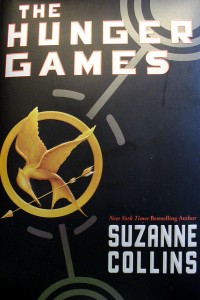I’m finally reading The Hunger Games. Only five years and one movie late. No spoilers, please. Oh, and I’m tweeting my favorite lines as I discover them, probably to the chagrin of the handful of people who follow me on Twitter.

I’ve read through Part I: The Tributes. It was tragic, but not really violent. The violence is yet to come. Ever since I wrote Jeremy Spoke last month, I’ve been thinking and rethinking how violence in our culture influences our behavior. While I don’t retract, “Garbage in, garbage out,” I’m struggling with this in light of our stories.
There is no great, compelling story without conflict and crisis. That conflict is most dramatically manifested in violence.
Lord of the Flies is violent. So is The Lord of the Rings. The Chronicles of Narnia. Les Misérables. Star Wars. The Godfather. The Matrix. Gone With the Wind. The Gospels. And so on.
Is some violence necessary in our stories? What makes it gratuitous? Should we shield our children? What flips the switch to unleash violent behavior in some people, but not others?
A few years ago I took a film analysis class at church. Yes, church. There’s no better place to consider human culture than within the context of God’s redemptive work for us through the death and resurrection of Christ.
We critiqued the messaging of movies. We examined what a film’s story and cinematography say about God, humans, our society, our destiny. We wrestled with themes Christians might shy away from: violence, nudity, profanity. We found our thresholds to be individual and subjective.
I think the point of a class like that, and a post like this, isn’t necessarily answers. Rather it’s to get us to pay attention.

We all break God’s law. There is none righteous. No, not one. Left to its natural course, our law-breaking gets worse, not better. We’re capable of horrific behavior. God abhors those who love violence. The One Hope for our depravity is a core change from death to life.
Maybe the message of Heathers was satirical and Pearl Jam’s Jeremy was a warning. Maybe the conflict, crisis, and violence of our stories, fiction and nonfiction, serve to spur us on to the Redeemer.
Bring to an end the violence of the wicked
and make the righteous secure—
You, the righteous God
Who probes minds and hearts. Psalm 7:9 NIV
The Hunger Games movie site where you can watch the official trailer.
Is some violence necessary in our stories? Where’s your threshold for viewing or reading it? How does violence in our culture influence behavior?
photo credit: damnyeahnich via photopin cc
photo credit: cinderellasg via photopin cc
Aimee,
I like your perspective here. I was raised in a environment where the violent nature of much of pop culture was often used as one good reason to completely avoid it all. I am not sure that is a realistic or even a positive expectation. Yet, I am certain too much violence is harmful at some level.
Your insights always make me think and reflect on topics like this
Darin
Thank you, Darin. I’m struggling with this now. On the one hand, I want to have a no tolerance policy for violence. But on the other hand, violence is an element of our broken world. It’s part of our stories, factual and fictional. Because of it we (Christians especially) have a role to protect, heal, console, organize, liberate. No easy answers here…
I am thinking you did not quite mean “chagrin” – as there is no shame felt by “followers” that I am aware of. You are, however, forgiven because of the apt use of “gratuitous”. That is my primary criteria, is content in fiction (or I suppose life in general) an important part of the story? Or was is merely gratuitous, inserted to fit a format, by the boys down in marketing who have no intent to invest effort in comprehending the “work”.
Chris rented some movies the other evening, and the one she had the most hope to enjoy was Flight, starring Denzel Washington … one of her favourite actors.
The opening scene has Captain Whitaker prostrate and drunk in a cheap motel room. A lady of convenience is buck naked, wondering on and off camera, more or less not really getting dressed too much. We sit through this scene, hoping it gets better. But the next sequence is another woman looking for money for drugs, and ends up being offered a “job” in the porn “industry”. We gave up and went to Movie II – it was from Disney, and lived up more to our expectations. (Joe is 16, and he was in attendance at movie night.)
Chris was disappointed that I (we) had decided to NOT watch that flick. I volunteered to watch it all the way through, more or less, the next day when the kids were otherwise occupied. It did get much better, and we ended up actually watching it.
Verdict was that the nudity was a useful tool to communicate the depravity of the main character – the almost-pornstar also was key to the plot. It ended up being a story of redemption, in my opinion. IE the depravity was NOT gratuitous. PASS. But you have to stay ever vigilant.
Heisenberg Uncertainty Principle – it applies to so very many things. In lay language, you cannot both the position and velocity of an electron in orbit because in order to “see” it, you had to hit it with a photon, and it isn’t where it was before you looked.
The Quantum Mechanic’s vacation
left his colleagues in dire consternation
for though it was shown – his speed was well known
his position was pure speculation.
You cannot observe something without actually changing the thing you observe. Electrons – they are easy to conceptualize the import thereof. Elephants less so, but still, to some degree.
The other side of the proverbial coin. You cannot observe something without changing also the observer. So many scientists overlook this, which they should not overlook. Casual overlooking in life in general leaves one desensitized to things that would really like to kill you. NOT APPROVED.
EOL
Roy, I think that’s the prime directive from Star Trek, too. I’ll have to check with my resident Trekkie to be sure :)
Vigilance becomes extremely important with the excess of information we receive. We would be wise to pay attention, critically analyze, and remain sensitive to what we’re taking in (or being fed). Not in a paranoid way, but in a media literate, active, intelligent way.
As always, thanks for your insight.